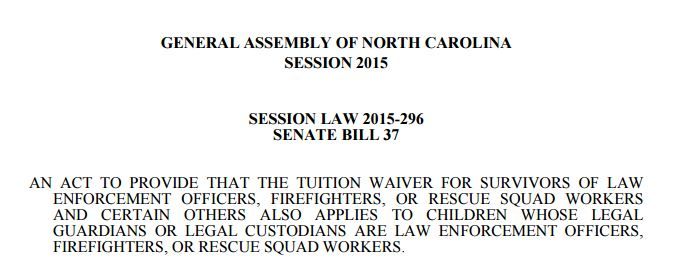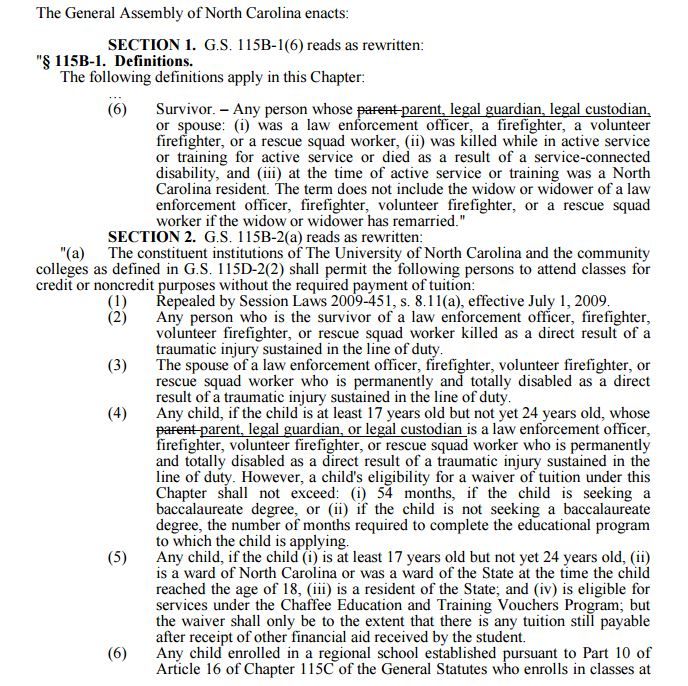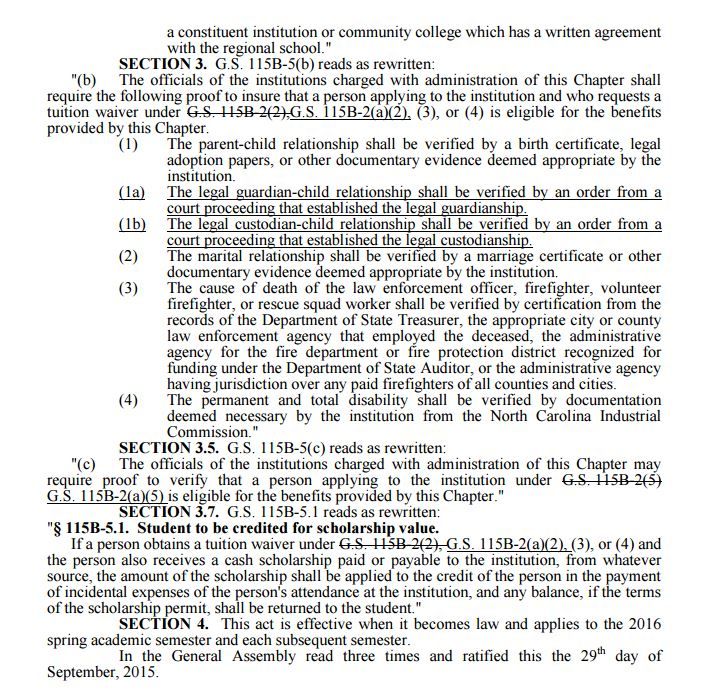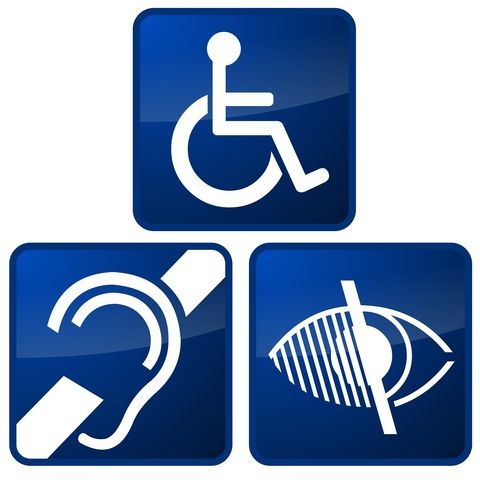The North Carolina General Assembly Ratified and Governor Pat McCrory signed New NC Fallen and Disabled First Responder Tuition Law “Senate Bill 37”
- Ratified Date September 29, 2015
- Approved October 30, 2015
- Applies to the 2016 spring academic semester and each subsequent semester
- Entitled: An Act to Provide that the Tuition Waiver for Survivors of Law Enforcement Officers, Firefighters, or Rescue Squad Workers. . .”
- Tuition Waiver – The University of North Carolina and the Community Colleges
This survivor benefit for family of First Responders permanently disabled or killed in the service of North Carolina is a good first step – Bill Powers

SEE: SENATE BILL 37

- Survivors
- Any person whose parent, legal guardian, legal custodian or spouse
- Law Enforcement Officer
- Firefighter
- Volunteer Firefighter
- Rescue Squad Worker
- Killed While in Active Service or Training
- AND WAS A NORTH CAROLINA RESIDENT
First Responders put their lives on the line everyday, this is the least we can do for them when tragedy strikes – Bill Powers


Modified Transcript of “New NC Fallen and Disabled First Responder Tuition Law” for the Hearing Impaired
Governor McCrory: Today, I ‘m proud to be with some of our finest here at the Charlotte Fire Department to
build on our commitment. The first is Senate Bill 37. Today the University of North
Carolina system and our North Carolina Community College has waived tuition for
survivors of law enforcement officers, fire fighters, volunteer fire fighters or rescue
squad workers who were killed in the line of duty or who were totally disabled in the
line of duty. Today we continue to build upon that commitment, supporting families of
fallen officers, fire fighters, volunteers and first responders.
Today, through Senate Bill 37, we are extending the tuition waiver to children whose
legal guardians or legal custodians are law enforcement officers, fire fighters, volunteer
fire fighters or rescue squad members who are killed or totally disabled in the line of
duty. In addition to signing this important legislation, support the families of fallen
officers and first responders, I am proud, also, to sign legislation supporting our National
Guard members. We’re going to do everything we can to support our National Guard. As
their commander, I’m going to do everything I can to support them.
I’m proud that our budget increased funding by 10% to bring tuition assistance for active
members of our National Guard to $2.1 million. This program helps our citizen soldiers
further their education and skills in a system they have earned. This benefit is available
to Guard members working toward a technical, community college, university or
graduate degree.
House Bill 709 expands this tuition assistance for National Guard members who are also
seeking a graduate certificate. Graduate certificates usually require a shorter period of
time to acquire, meaning our active National Guard members can get assistance in
attaining higher education, at a quicker pace, that can help them get jobs and skills
faster.
They have a tough balance as it is. The National Guard, their jobs, their families and, as
they want to pursue education, we want to make that as viable a choice for them of
trying to balance all these responsibilities that they have.
I’m also pleased to report, March, on our bond referendum, which every person in
North Carolina who’s registered to vote will have a chance to vote on, that we’re putting
money to help the National Guard facilities. Many of the National Guard facilities are in
very, very poor working condition. They aren’t suitable for the men and women that are
risking their lives, so we’re repairing and fixing about four or five different National
Guard facilities throughout North Carolina because they deserve it. It’s also a good deal
for the taxpayers because it’s not if they need to be prepared, it’s when. The longer we
wait, the more expensive it’s going to be for the taxpayers of North Carolina.
The third piece of legislation I’d like to sign today, pertains to the North Carolina Military
Affairs Commission. What we’ve done regarding the military, I’m very, very proud of
during the last three years. We’ve free … I’m sorry, in-state college tuition for men and
women coming back home from Afghanistan and Iraq, even though they’re not
residents of North Carolina. We provided ways to bypass unnecessary education and
training when those men and women already have the skills. For example, if you could
drive a truck under fire in Afghanistan, I don’t think you need to go through new truck
driver training in North Carolina to get truck certification. You ought to be able to bypass
those rules. If you can do it in Afghanistan under fire, I think you could drive a truck in
North Carolina. These are the kind of common sense things that we’re trying to do to
help members of our military.
The Commission that I’m talking about is the Military Affairs Commission. It’s charged
with providing advice, counsel and recommendations to me, the General Assembly and
other state agencies on issues pertaining to the North Carolina military installations and
the National Guard. Currently, the Commission has 21 voting member and what we’re
doing is adding two members to this board, a current or retired member of the North
Carolina National Guard. Doesn’t that make sense that we have someone from the
National Guard on this Military Affairs Commission? Second, a current retired member
of the Reserve component of the Air Force, Army, Navy, or Marines. This adds further
input and ideas to help all members of the military in North Carolina, including our
Guard and including the Reserves of those wonderful branches of the military.
We’re going to do everything we can to protect those who protect us.
 Carolina Criminal Defense & DUI Lawyer Updates
Carolina Criminal Defense & DUI Lawyer Updates